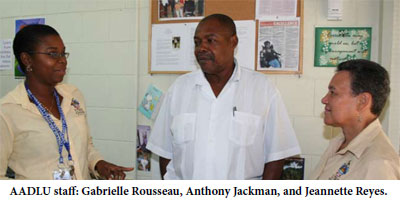 |
 |
 |
|
July 2009
|
Quiet enablers: A small Unit of care makes a big difference What is AADLU ? Established in 2007 after The UWI recognised that there was a need to provide adequate support for students with disabilities, the Academic Advising Disability Liaison Unit emerged from a new policy and has helped champion the cause of students who would have otherwise had a difficult time at the St Augustine campus. AADLU exists primarily to smooth the way for students with disabilities, to hear their woes and to liaise between them, administration and faculty to provide solutions. According to Jack,* AADLU has helped him “immensely,” and that is an understatement, he declares. AADLU acted on his behalf to shift his upper level classes to a ground floor and thus made his life easier. The Unit currently operates out of offices just opposite the entrance to the Library on the southern side of the St Augustine campus. It is headed by Anthony Jackman, with the assistance of three members of staff. It keeps a database of students with disabilities, primarily gathered from information provided by the students when they register with the Unit. Currently there are around 180 students registered, with disabilities ranging from dyslexia, the most common, to cerebral palsy and physical impairments. “Staff and students tended to look down on students, but since the policy has been set up, there is a recognition that the student population is changing. We have to meet international standards” said Jackman. And that is what they have been doing. Jack’s story is not an isolated one, in fact, the students we spoke with have all said that the AADLU has played a large part in their ability to settle into university life and has given them the support, and at times, the necessary lifeline to deal with all that is thrown at them daily. Take Shamla who has Cerebral Palsy, she is passionate in her appreciation of how much the AADLU has helped her. Her experience at The UWI has been a wonderful one where, because of the intervention of AADLU , she has received the support she needs from both her lecturers and friends, who have learnt how to accommodate her every need and help her manage. For Camille*, the AADLU has helped her write her exams in comfort, despite her visual impairment and all herrequests have been met. Judging from responses, it won’t be a stretch to say that the staff at the AADLU act like family to all of their students as they are continuously described as considerate and approachable. But AADLU is still young and its effect on the UWI is yet to be fully felt by those who do not have direct contact with them. Jackman himself knows that education is the key to changing the atmosphere of the UWI to one that will be less wary and more open to those with disabilities. “We’ve embarked on educational programmes for staff. We’ve had But still the reality is far from ideal. “The system is still not fully operational” he concedes, but they have not let this stop them from working towards their goal of making campus life as smooth as possible for students with disabilities. “We have made some inroads in terms of bringing it [awareness] to the academic and student population,” he said, but he acknowledges that it is difficult to change the culture. “Some lecturers are still reluctant to accommodate students’ needs.” This is felt by all students who register with AADLU , who know that to fully cope they need the support of the unit. On countless moments they have all used this support to try a little harder to overcome the obstacles. Candace, a Criminology student who has Dyslexia, knows this all too well. She credits the AADLU for helping her understand her disability as well as showing her strategies and mechanisms to deal with its frustrations. “Most people believe that you can watch someone and tell they have a disability. With me, you can’t and people need to understand that,” she says. She understands that she needs support; support from family, support from AADLU and friends who at times act as editors for her many papers. This is all necessary for her to get through university and even though it is a hindrance at times, it’s something she needs to do to move forward. For her each mistake and hindrance is just another opportunity to work harder to achieve greater things. Candace and the other students vehemently agree that the university population needs to be sensitised about the work of the unit as well as the types of disabilities there are so as to prevent discrimination and insensitive behaviours. To these students AADLU is their saving grace, their champion, their support in times of frustration and discrimination. AADLU provides the voice that they would never have had and is in fact, a necessity, at a University that is taking great leaps and bounds into the future. Just ask them, they will tell you. *Names have been changed for privacy. |

 He cannot climb steps, he cannot walk for even short distances comfortably, but he is as dedicated and studious as any Humanities student could be. How has he managed to cope? In five letters: AADLU .
He cannot climb steps, he cannot walk for even short distances comfortably, but he is as dedicated and studious as any Humanities student could be. How has he managed to cope? In five letters: AADLU .
 workshops, two on dyslexia. We take part at the orientation programme, sometimes sharing a booth with the Ministry of Social Development,” he said.
workshops, two on dyslexia. We take part at the orientation programme, sometimes sharing a booth with the Ministry of Social Development,” he said.